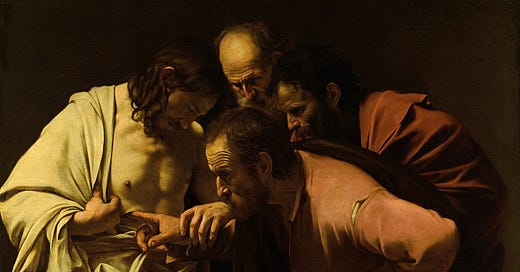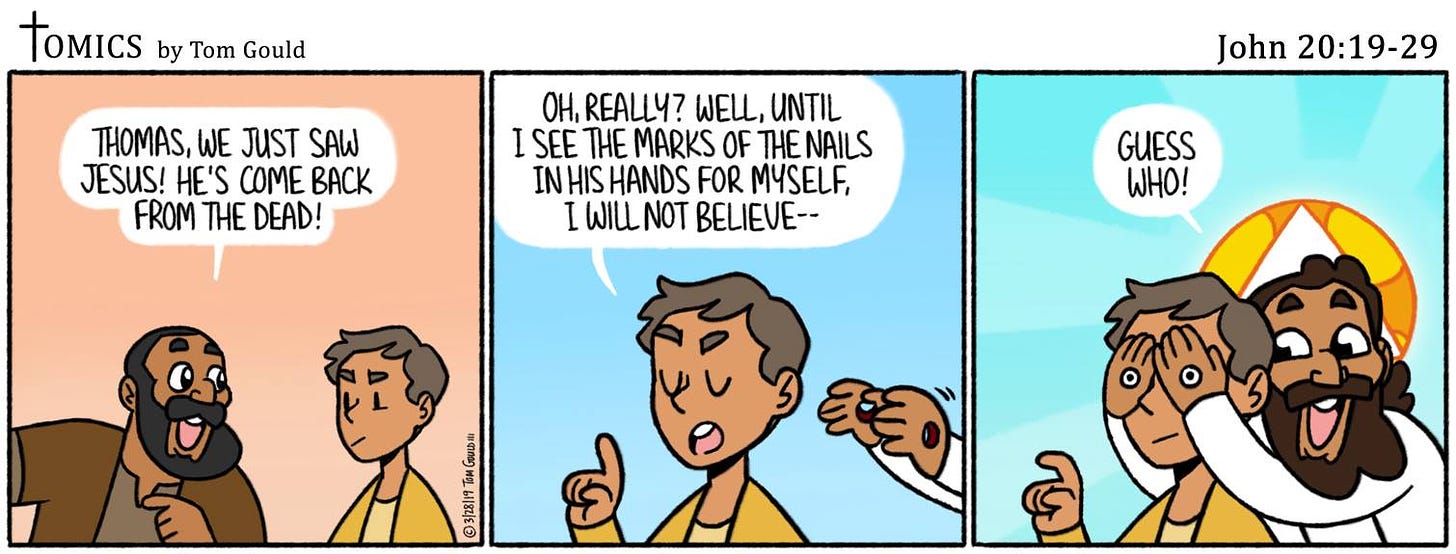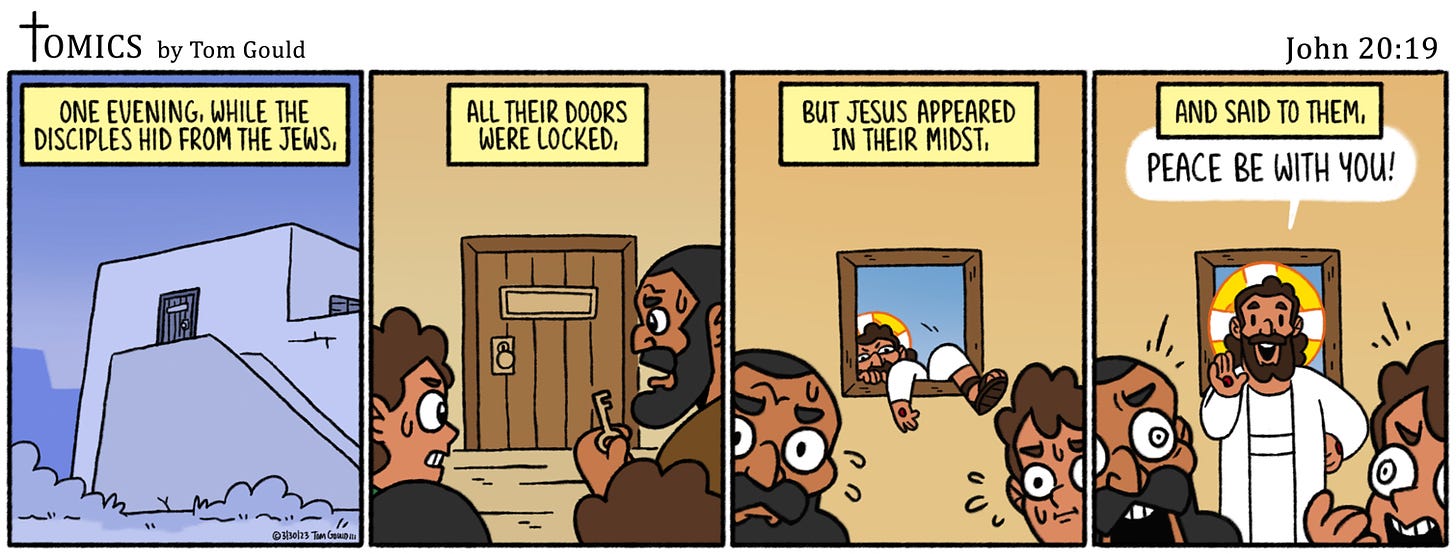Today is also known as the Sunday of Divine Mercy. It was instituted in 2000, a few days after the canonization of St. Faustina. Jesus had appeared before her, and gave her instructions for the Divine Mercy Chaplet. He also asked her to convince the Church to institute the Feast of Divine Mercy—
On that day the very depths of My tender mercy are open. I pour out a whole ocean of graces upon those souls who approach the fount of My mercy. The soul that will go to Confession and receive Holy Communion shall obtain complete forgiveness of sins and punishment. On that day are open all the divine floodgates through which graces flow.
So, this is your reminder to go to confession if you didn’t during Lent!
Reading 1
Acts 2:42-47
They devoted themselves to the teaching of the apostles and to the communal life, to the breaking of bread and to the prayers. Awe came upon everyone, and many wonders and signs were done through the apostles. All who believed were together and had all things in common; they would sell their property and possessions and divide them among all according to each one’s need. Every day they devoted themselves to meeting together in the temple area and to breaking bread in their homes. They ate their meals with exultation and sincerity of heart, praising God and enjoying favor with all the people. And every day the Lord added to their number those who were being saved.
This is a depiction of an idyllic time in Christian history. The community is small, and it was possible for every Christian to know every other Christian. They didn’t even see themselves as separate from the Jews yet, visiting the temple every day.
It’s hard to imagine sharing all of your property with the world wide community of Christians now. The whole of Christendom is just too big to comprehend on a personal level, which in certain ways is good.
But it means we have to work harder to truly participate in our local communities the way the first Christians did. Do we break bread and say prayers with our neighbors? Are you we adding to the number of saved every day?
Responsorial Psalm
Ps 118:2-4, 13-15, 22-24
R. Give thanks to the LORD for he is good, his love is everlasting.
Let the house of Israel say,
“His mercy endures forever.”
Let the house of Aaron say,
“His mercy endures forever.”
Let those who fear the LORD say,
“His mercy endures forever.”
R. Give thanks to the LORD for he is good, his love is everlasting.
I was hard pressed and was falling,
but the LORD helped me.
My strength and my courage is the LORD,
and he has been my savior.
The joyful shout of victory
in the tents of the just:
R. Give thanks to the LORD for he is good, his love is everlasting.
The stone which the builders rejected
has become the cornerstone.
By the LORD has this been done;
it is wonderful in our eyes.
This is the day the LORD has made;
let us be glad and rejoice in it.
R. Give thanks to the LORD for he is good, his love is everlasting.
The psalmist points to times Israel called to God for help against invading enemies, and God responded with mercy. The refrain reminds us to be thankful for all the times God has been merciful to us.
You can take it a step further, even. Thank God for His answer to your petitions before you even see the results. Always bear in mind, the answer may not be what you wanted or expected, but we can be confident it will be the most merciful response.
Reading 2
1 Pt 1:3-9
Blessed be the God and Father of our Lord Jesus Christ, who in his great mercy gave us a new birth to a living hope through the resurrection of Jesus Christ from the dead, to an inheritance that is imperishable, undefiled, and unfading, kept in heaven for you who by the power of God are safeguarded through faith, to a salvation that is ready to be revealed in the final time. In this you rejoice, although now for a little while you may have to suffer through various trials, so that the genuineness of your faith, more precious than gold that is perishable even though tested by fire, may prove to be for praise, glory, and honor at the revelation of Jesus Christ. Although you have not seen him you love him; even though you do not see him now yet believe in him, you rejoice with an indescribable and glorious joy, as you attain the goal of your faith, the salvation of your souls.
God didn’t have to send His only Son to save us, but in His mercy, He did. He gave us an opportunity for new life.
Jesus had to suffer and die, to offer Himself up as sacrifice, so that we could live. Likewise, we’re not going to enter into knew life without “various trials.” Peter reminds us to be thankful even for those tests, because they prove to be for the praise, glory, and honor of Jesus.
It’s not always easy to be thankful in this way, at least while we’re going through it. But if anyone understands that, it’s Jesus, who Himself prayed for the cup of crucifixion to pass his lips. Yet, he still prayed that God’s will be done. We have to do the same, no matter what.
Alleluia
Jn 20:29
R. Alleluia, alleluia.
You believe in me, Thomas, because you have seen me, says the Lord;
blessed are they who have not seen me, but still believe!
R. Alleluia, alleluia.
Gospel
Jn 20:19-31
On the evening of that first day of the week, when the doors were locked, where the disciples were, for fear of the Jews, Jesus came and stood in their midst and said to them, “Peace be with you.”
When he had said this, he showed them his hands and his side. The disciples rejoiced when they saw the Lord. Jesus said to them again, “Peace be with you. As the Father has sent me, so I send you.” And when he had said this, he breathed on them and said to them, “Receive the Holy Spirit. Whose sins you forgive are forgiven them, and whose sins you retain are retained.”
Thomas, called Didymus, one of the Twelve, was not with them when Jesus came. So the other disciples said to him, “We have seen the Lord.” But he said to them, “Unless I see the mark of the nails in his hands and put my finger into the nailmarks and put my hand into his side, I will not believe.”
Now a week later his disciples were again inside and Thomas was with them. Jesus came, although the doors were locked, and stood in their midst and said, “Peace be with you.” Then he said to Thomas, “Put your finger here and see my hands, and bring your hand and put it into my side, and do not be unbelieving, but believe.”
Thomas answered and said to him, “My Lord and my God!” Jesus said to him, “Have you come to believe because you have seen me? Blessed are those who have not seen and have believed.”
Now, Jesus did many other signs in the presence of his disciples that are not written in this book. But these are written that you may come to believe that Jesus is the Christ, the Son of God, and that through this belief you may have life in his name.
I’ve always thought it unfair that, after one bout of skepticism, St. Thomas will forever be known as “Doubting Thomas.” I mean, Jesus did something that no one in history had ever done before. I feel like “Perfectly Reasonable Thomas” would be a better nickname.
My middle name is Thomas, so I always took this story a little personally. Matthew is a writer, but Thomas is the one who wouldn’t believe his friends. He would only trust the evidence of his own senses.
Jesus knows Thomas isn’t the only one; in fact, the number of Perfectly Reasonable Thomases only grows over time. Faith truly is a blessing.






